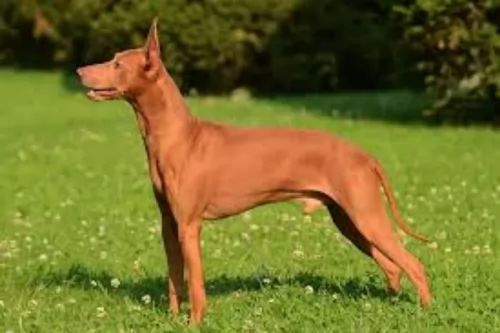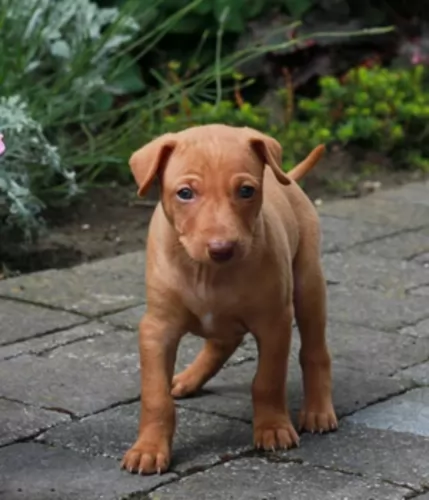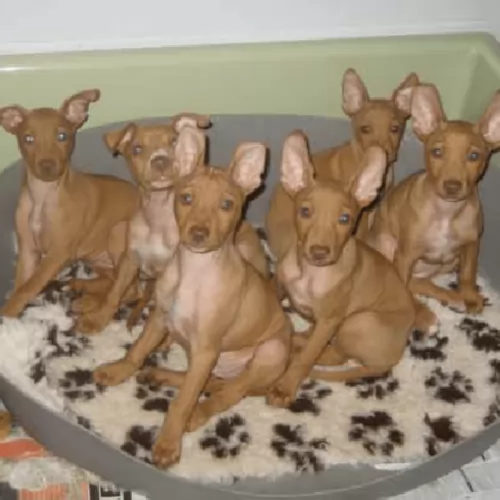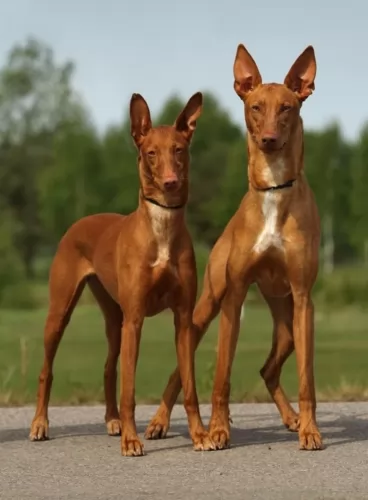 Petzlover
Petzlover Cirneco dell'Etna is originated from Italy but Great Dane is originated from Germany. Cirneco dell'Etna may grow 34 cm / 13 inches shorter than Great Dane. Cirneco dell'Etna may weigh 78 kg / 171 pounds lesser than Great Dane. Both Cirneco dell'Etna and Great Dane has same life span. Cirneco dell'Etna may have less litter size than Great Dane. Cirneco dell'Etna requires Moderate Maintenance. But Great Dane requires Low Maintenance
Cirneco dell'Etna is originated from Italy but Great Dane is originated from Germany. Cirneco dell'Etna may grow 34 cm / 13 inches shorter than Great Dane. Cirneco dell'Etna may weigh 78 kg / 171 pounds lesser than Great Dane. Both Cirneco dell'Etna and Great Dane has same life span. Cirneco dell'Etna may have less litter size than Great Dane. Cirneco dell'Etna requires Moderate Maintenance. But Great Dane requires Low Maintenance
 The Cirneco dell’Etna comes from the island of Sicily and not mainland Italy, although it is considered an Italian dog. It is a small dog that hunted rabbits and its calling card was its ability to go for hours without water or food. They have terrific endurance and a good sense of smell. They were developed for the harsh terrain they worked around places like Mount Etna. Of all the Mediterranean island hunting dogs, the Cirneco de’Etna is the smallest.
The Cirneco dell’Etna comes from the island of Sicily and not mainland Italy, although it is considered an Italian dog. It is a small dog that hunted rabbits and its calling card was its ability to go for hours without water or food. They have terrific endurance and a good sense of smell. They were developed for the harsh terrain they worked around places like Mount Etna. Of all the Mediterranean island hunting dogs, the Cirneco de’Etna is the smallest.
This is a very ancient breed, surviving on its hunting skills alone for thousands of years on Sicily. They then became guard dogs for the peasants. Because they had such speed, sense of smell, alertness and sight, they were great hunters.
Today’s Cirneco de’Etna is highly competitive in confirmation and make terrific pets. They are exceedingly friendly, energetic and low maintenance. Lure coursing is what they really excel at. They are good at agility and pursuit games as well.
 Known as the Deutsche Dogge or Apollo of dogs, the giant-breed Great Dane hails from Germany and not Denmark as many people believe.
Known as the Deutsche Dogge or Apollo of dogs, the giant-breed Great Dane hails from Germany and not Denmark as many people believe.
The large Great Dane has been around for about 400 years already. They descend from mastiff-like dogs, being needed to protect country estates.
In the 18th century, apart from watching over estates, they were also popular with the upper class for sport.
 The Cirneco de’Etna is a sleek, muscular sighthound. His ears are close together and high on his head. The head is lean, and the skull is almost flat in profile. The muzzle is about the same length as the skull and the nose is large and its coloring matches the dog’s coat. They have hard pads the same color as their nails, but they are never black.
The Cirneco de’Etna is a sleek, muscular sighthound. His ears are close together and high on his head. The head is lean, and the skull is almost flat in profile. The muzzle is about the same length as the skull and the nose is large and its coloring matches the dog’s coat. They have hard pads the same color as their nails, but they are never black.
 The Great Dame is a tall, lean, athletic, muscular, elegant looking dog. He can stand anything between 76–86cm in height and weigh around 54–90kg. The large head is long and narrow, and the medium sized floppy ears can be left or they can be cropped.
The Great Dame is a tall, lean, athletic, muscular, elegant looking dog. He can stand anything between 76–86cm in height and weigh around 54–90kg. The large head is long and narrow, and the medium sized floppy ears can be left or they can be cropped.
The tail is long and held low. The coat is short and smooth and can be in several colors such as fawn, black or brindle.
Any kind of aggressiveness was bred out of the Great Dane and today he is a gentle giant of a dog, getting on well with other dogs, children and everyone in his human family.
Even though he is a gentle giant, he will still require training and socialization just because of his size. Then they become the devoted pet that they are so well known to be. You'll want to know that when he comes indoors, he will obey you when you tell him to lie-down, sit or come, otherwise his sheer size will see him knocking things accidentally off table-tops.
He is an intelligent dog and is eager to please so he'll learn easily. He craves human companionship, so make sure that your social Dane has plenty of interaction with you.
 The Great Dane is a large breed, bred to hunt wild boar. The intelligence, bravery and fearless nature of the dog meant that he was sought after for this task.
The Great Dane is a large breed, bred to hunt wild boar. The intelligence, bravery and fearless nature of the dog meant that he was sought after for this task.
Known as the Apollo of Dogs, you won’t find the Great Dane being used for hunting purposes anymore, being more suited as a companion dog.
While developed as a working breed, today he is a well balanced, intelligent, calm, loving, social, dependable dog that just wants to be loved by his human family and to provide love, loyalty and companionship back in return.
 Like many dogs that come from ancient breeds with little cross breeding over the years, there are not a lot of inherited issues for the Cirneco de’Etna. Also, there are so few dogs remaining that little is known about their health in general and there are no studies to go on. Some breeders will do test despite the fact that none are recommended.
Like many dogs that come from ancient breeds with little cross breeding over the years, there are not a lot of inherited issues for the Cirneco de’Etna. Also, there are so few dogs remaining that little is known about their health in general and there are no studies to go on. Some breeders will do test despite the fact that none are recommended.
Their most common health issues are acquired such as injuries from running or competitions and obesity. Both can be controlled by the owner.
 Typically of giant dogs, the Great Dane doesn't have a particularly long life-span and will live to be about 8 to 10 years of age. Also, giant-breed dogs like this are susceptible to what is known as bloat.
Typically of giant dogs, the Great Dane doesn't have a particularly long life-span and will live to be about 8 to 10 years of age. Also, giant-breed dogs like this are susceptible to what is known as bloat.
You'll notice it because there is swelling of the stomach with gas buildup and also twisting of the stomach. It's a life-threatening condition and you'll need to get your dog to the vet as soon as possible. You can combat it by feeding him smaller, more frequent meals and perhaps buying a slow-feeder dish, forcing your hungry pet to eat slower and not gulp his food down.
Also, large dogs like this can develop hip dysplasia and with a dog like the Great Dane, it takes a while for the bones and joints to grow and then become stable. That is why it is important not to make him do any vigorous exercise till he is at least 18 months of age, as these exercises can put a lot of stress on the joints and bones which can lead to hip dysplasia later on.
 The Cirneco needs a good quality food since they are such high energy dogs. Be careful not to overfeed them so that they become obese.
The Cirneco needs a good quality food since they are such high energy dogs. Be careful not to overfeed them so that they become obese.
As previously mentioned, the main concern for owners is injuries acquired while on a running course or in the activities of daily living. They have been known to hurt their feet. They need their ears checked regularly for any signs of infection or irritation. Clean out any excess water or dirt.
This is an intelligent, hardy breed that needs mental and physical stimulation. They need a job, or they can be a major problem. They love hunting of course but also excel at agility, lure crossing, and competition. He is loyal and loves being with people. Take him for long walks but don’t let him off the leash.
 This is a large dog so you’ll notice that with commercially manufactured dog foods, there are those made specially for large- or giant breeds. It is important to choose the right dog food for his large size so that you can be sure he gets the right amount of nutrients in for him to grow strong and healthy.
This is a large dog so you’ll notice that with commercially manufactured dog foods, there are those made specially for large- or giant breeds. It is important to choose the right dog food for his large size so that you can be sure he gets the right amount of nutrients in for him to grow strong and healthy.
If you aren't sure about what food would most benefit your Great Dane, ask your vet. While it is important to also feed him quality home-made food and raw meat, when buying kibble for him,check the label of the food you buy him and make sure that the concentration of protein isn’t more than 23 to 25%.
Remember to provide him with a constant supply of fresh, cool water.
Brush your Great Dane’s coat at least twice a week. He has a short, smooth coat so it will be easy, and the brushing will keep his coat soft and shiny. Use this time to also check for fleas and ticks or lumps. You will also need to check his nails and trim them if they don’t trim down on their own.
Your Great Dane will need to be exercised every day if you want him to maintain his lean, muscular shape. It keeps him happy too. He isn’t the kind of dog though that you want to turn into your running partner when you go jogging or cycling. He can go on a walk and play in the garden, but the exercising shouldn’t be for long periods of time.
Every puppy needs to get to the vet for his first check-up when he is 6 weeks of age, and your Dane will also have to. As a puppy he will need to be de-wormed which will happen with this 6 week check up. He will also be vaccinated for distemper.